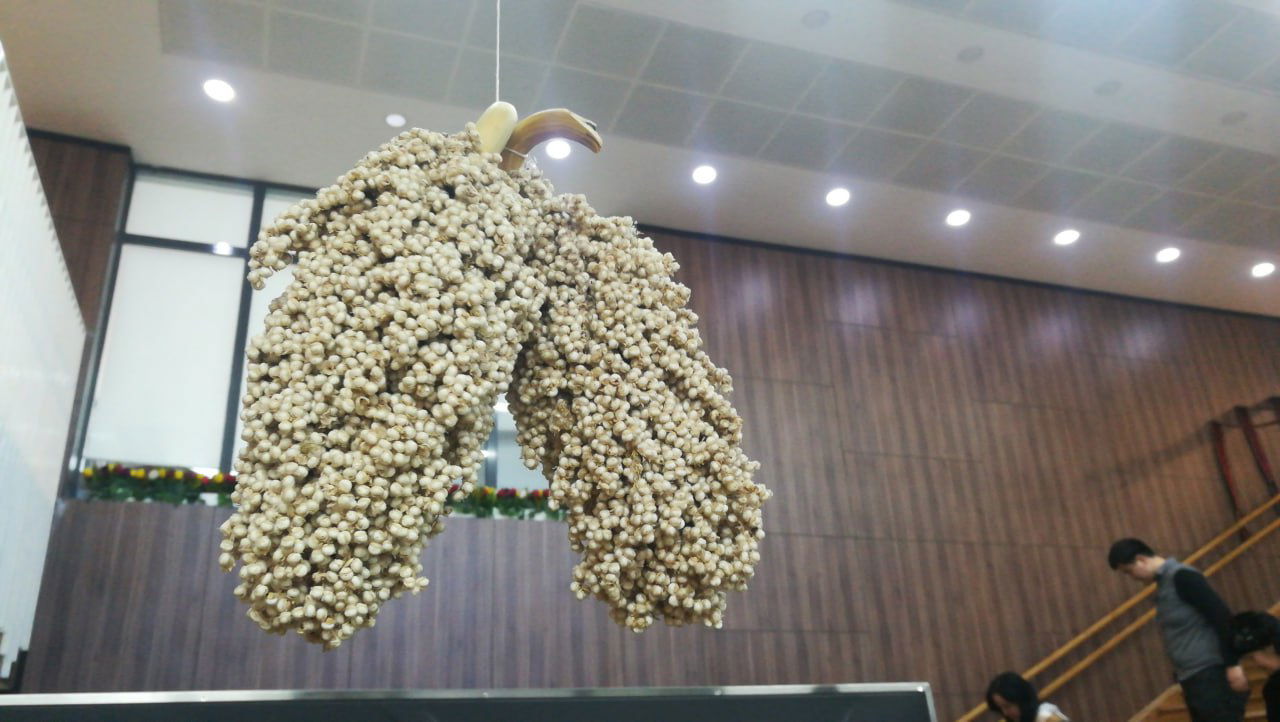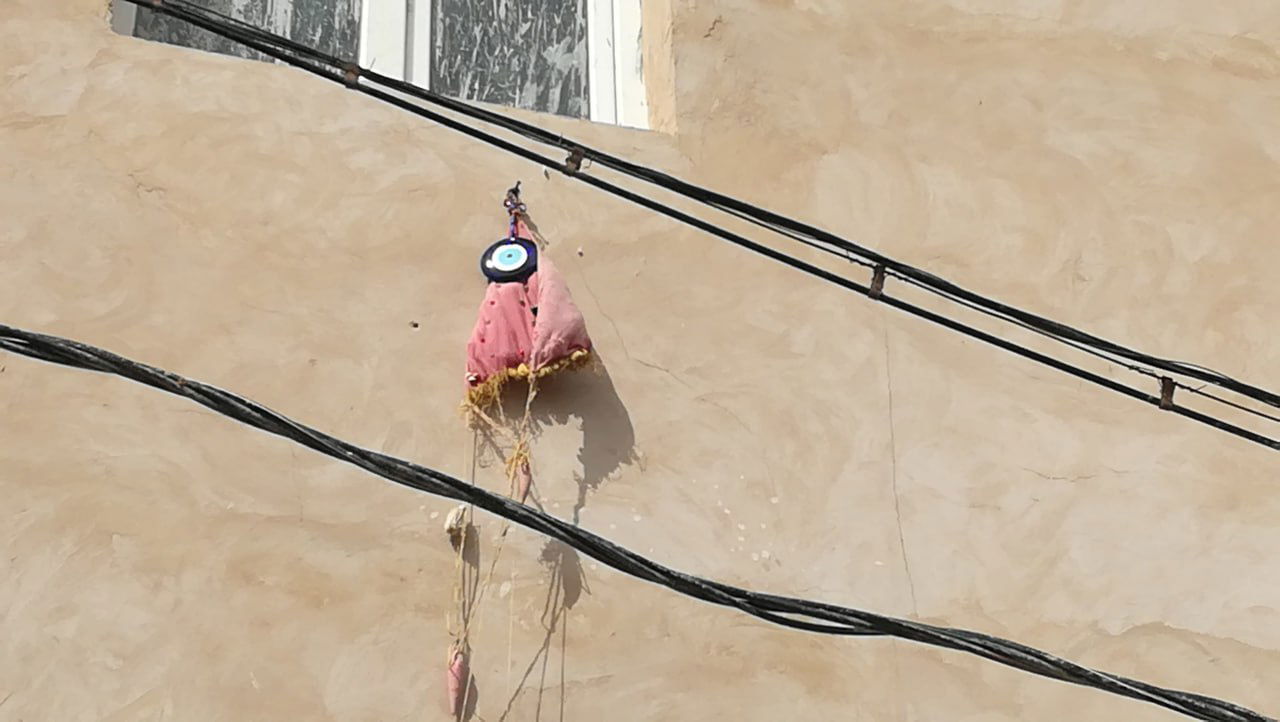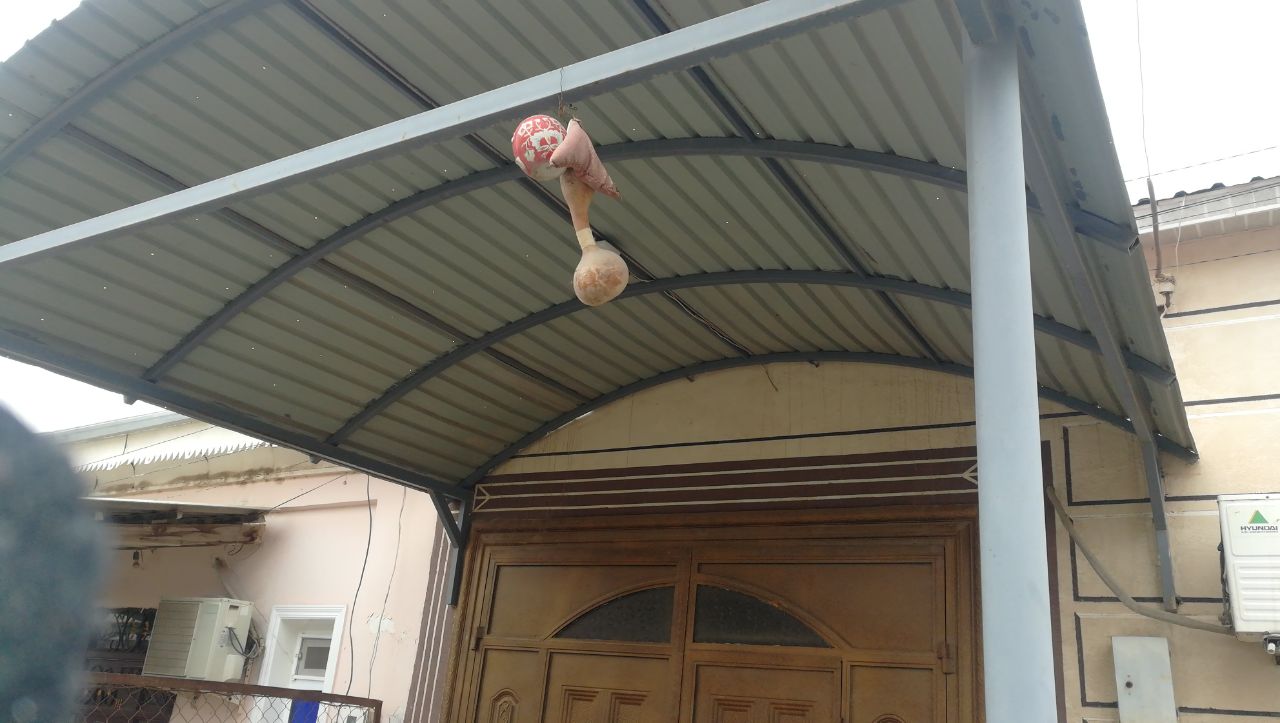Sorghum and Superstitions
Sorghum “What did my hair do to you?” I thought to myself as Dinara gave my poor hair another vigorous tug. I was lying on a massage table, trying to see some bright side of my situation. Zahra, my regular masseuse, was somewhere on a vacation in Kazakhstan, no doubt having a better time than I. In her absence, I was directed to her colleague Dinara at a different location.
There had been nothing wrong with my muscles before I arrived but, as Dinara ruthlessly tried to separate my calf muscles from their rightful position by digging a wedge between them with her fingers, I was certain there was going to be plenty wrong with me the following day. And yet, I stayed. The thought crossed my mind yet again that I really should have just waited for Zahra’s return. My grim thoughts were interrupted by something that sounded like a quiet sigh. Perhaps Dinara had been having a rough day, which would also explain her sadistic inclination. There is nothing wrong with hearing a sigh, as long as it doesn’t come from the wrong direction. Which, I thought, this one did. It triggered all kinds of thoughts and images. We are so vulnerable lying there, almost naked, not knowing what’s going on around us, trusting that the establishment is not a front for an organ harvesting operation. I do drink a lot of water, but still … who would want my well-used kidneys? I tried to comfort myself. The sigh came again. This time I was convinced that it came from the wrong side of the table. I quickly lifted my head. There were two young women standing on the left side of the table staring at me. How creepy can that be? I turned to the right and asked Dinara, “Why?” She didn’t say anything, so I repeated. “Why are they here?” “Oh, they are students,” she said, unconcerned. When I lifted my head again two minutes later, they were gone. How weird was that? The unusual session continued with Dinara placing something small and round on my back. She pressed it and it slurped and sucked, “Slurrpppped,” like a miniature vacuum cleaner. It immediately brought back a discussion of several moths earlier. At that time, our colleagues Beth and Jack had joined us for a dinner and somehow between French fries, which for some reason are always brought first, and the main meal, the discussion turned to strange health care practices. “I love getting the toxins out with cupping. I had it done in the Philippines last summer,” Beth raved. I looked at her, puzzled, and she immediately pulled out her phone and used Google images to show me pictures that could have been taken at the Guantanamo prison.
“This looks painful,” I commented, looking at someone’s back mutilated with red, angry-looking circular spots.
“No, it’s not. And it just sucks all the toxins out of your body.”
“Hmm, interesting. So, it just sucks the toxins out of your system,” I repeated trying not to sound too incredulous.
“Yes. It’s an old Asian method,” she added.
“Hmm, very interesting,” I sat there thinking, “Maybe less fries would do the job too. And cheaper.”
Beth was not finished with her toxin advice. “Yeah, during COVID, I also taped cut onions to my feet. That is supposed to get rid of toxins too.”
“Wouldn’t it be more effective if eaten? It is true that it’s full of vitamins,” the old cynic in me couldn’t help it.
“Don’t know. Maybe to get the toxins out it needs the skin contact.”
“Don’t say. Did it work?”
“I don’t know. But I never got COVID.”
“Hmm, so interesting,” I nodded sagely.
This conversation came back to me in a flash, the moment Dinara applied the first cup. It did not hurt, so I thought, “Well, why not. As long as it doesn’t hurt, the worst-case scenario is that I leave with some ugly but temporary birth marks.” Dinara probably took it easy on me and the little Hoovers went underused leaving only one mark out of ten suction cups that she had used.
I returned from my massage to the school humming with activities, even though it was Saturday. The students had been asked to stay the weekend, whether they liked it or not, because we were celebrating. Whether we liked it, or not. The previous Monday we had been informed that, on Saturday, the staff and some parents would prepare a Sorghum and Turkey dish, and we were all invited to enjoy some traditional festivities, including dancing and games. This is a traditional Karakalpakstan dish, and this is the first year that the people all over Karakalpakstan decided to celebrate it. Why that particular Saturday? I never heard any sensible explanation. All communication leading to this event was done on social media, which might explain the speed and spontaneity if not the rationale.
This event very conveniently happened just when the school needed to check off the CIS accreditation ‘box’ stipulating that we involve parents in our school activities. The thought that there would be a lot of ‘Kodak moments’ – aka ‘evidence’ – must have gone through the Admin’s minds when they enthusiastically agreed to participate. Our school has been going through the process of CIS (Council of International Schools) accreditation. This is a very stringent process and, as a result, we live in constant fear of dying under an avalanche of paperwork, and the word ‘evidence’ is recurring in our collective nightmares.

The preparation for the celebration took five days, and it could not have happened without the help of many parents. This labor-intensive dish consists of small dumplings made of sorghum flour and pieces of turkey. After all that effort, it turned out to be one of the most uninspiring dishes I have ever tasted. Ever. But the background information was interesting. When I asked my students what the sorghum plant was, they did not know the translation, but they took me to the auditorium and showed it to me hanging from the ceiling where it had been placed earlier that day. It was a strange looking thing. For the lack of a better comparison, it resembled a cluster of miniature wine grapes with the individual grapes looking like shrivelled white popcorn.

“Sur… what?” I responded when I heard the name for the first time.
“Sorghum,” Dave repeated patiently.
“What again?”
“Think of it as sore and gums. Like your gums are sore. Sorghum.”
“Yeah, that’s easy for you to say, with your elephant-like memory. I will probably remember it as sore tooth.”
After we Googled it, we learned that it also grows in the US, but only in very dry areas. Just like the one Nukus is located in. We also found out to our amusement, that the English translation is – sorghum. Don’t we live in a wonderful world where we can learn something new almost every day. Never mind that half of the population already knows it.
The event that spelled out the end for many turkeys brought in a lot of guests. Even our ex-director showed up, carving time out of her busy schedule. Zulfiya belongs to those superwomen, who, having shown competence, are loaded with more and more duties, and they thrive. In our first year she was Vice-Principal, and took over the post of Director part-way through the year. Last year she was still the Director, responsible for our school only. This year, in addition to her regular duties, she was tasked with converting several regular schools in our district into Specialist schools. Her latest accomplishment is bringing a new life into the world. When we returned from our summer holiday, we noticed that she had gained some weight. For a week we attributed it to eating too much to relieve the stress of increased responsibility. Shortly afterwards, when she announced that she was expecting another baby, we had to discard this misguided notion. The transformation of the district schools kept her so busy that we hardly saw her. At the end of November came the news that she delivered a healthy baby boy. How is that for a super-achiever? Compare that to the rest of us who get flustered when asked to fill in an extra form. True, we have already filled in the same form twice, but that is not the point here. Some people are just irrepressible achievers.
Some of the traditional Karakalpak and Uzbek music sounds very strange to my ear, and not in a good way, but I always enjoy the dance. This event was no exception. We had our students performing, as well as some guests from the local college. Uzbekistan is steeped in traditions, and it is nice to see them passed on to the next generation. To my amusement, I also learned about some superstitions. The theme of our latest course unit was ‘Lucky Breaks’ and, inevitably, the talk turned to bad luck as well as good luck. And that is when I found out that, in Uzbekistan, the number 13 is nothing to be concerned about. That begs a question. If you come from a country where most people believe that 13 brings bad luck and you cross into a country where this is not the case, should you still fear it? Play it safe, I told myself, and tiptoe around it anyway.
The students also told me that many people still carry a bit of salt with them for protection against evil wishers. “So, who has some salt on you right now?” I immediately wanted to know. Two kids raised their hand. Nurlibay pulled out a small piece of gray rock salt, and Oybek, after searching throughout his pockets, unclipped a small triangular shape packet sewn by his mom. Evidently, that too held a bit of salt. “I totally forgot my mom put it there,” he confessed. I wondered how often he washed his uniform jacket but refrained from asking. “Well, why not,” I said. “You have nothing to lose. Worst case scenario, you have something to make the cafeteria food taste better.” They always complain about the cafeteria food. Those that got the joke laughed. Those that didn’t, laughed anyway.

The girls then volunteered that their moms make them wear special bracelets every time they attend some big social gathering such as a wedding. These bracelets too serve to ward off any envy and ill-thinking that could be present during big social events that bring together many people, not all of them sharing equally in the happiness of such occasions.

Many houses have a plastic bottle hanging from the outside eavestroughs. The most recent contraption I noticed on my walks was hanging from a house still under construction. The bottles come in different shapes and sizes, but one thing unite them all. Purpose. Apparently, the bottle holds a bit of salt and pepper and sometimes hot dry chilli pepper; a combo to ward against evil eye and envy of others. I don’t know about evil eye, but this spicy combo should definitely turn away some rodents, I mused when I heard it for the first time.

When I shared my findings about Uzbek superstitions with Beth, she responded, “That is amazing. So much superstition!” I just laughed.